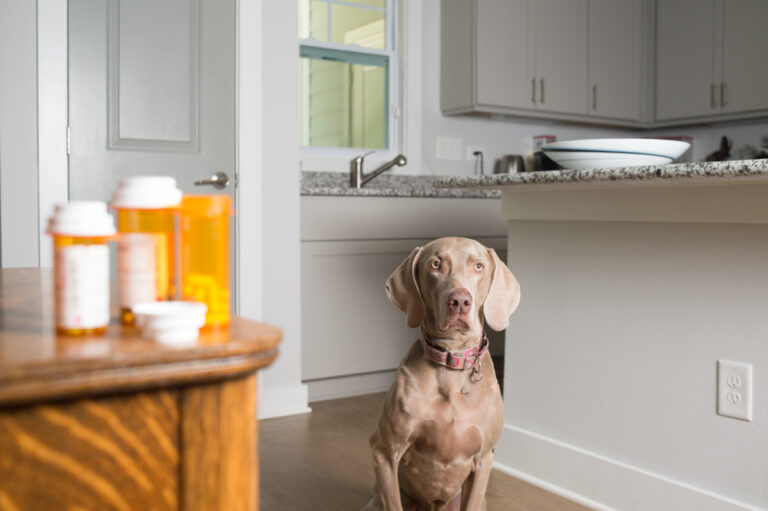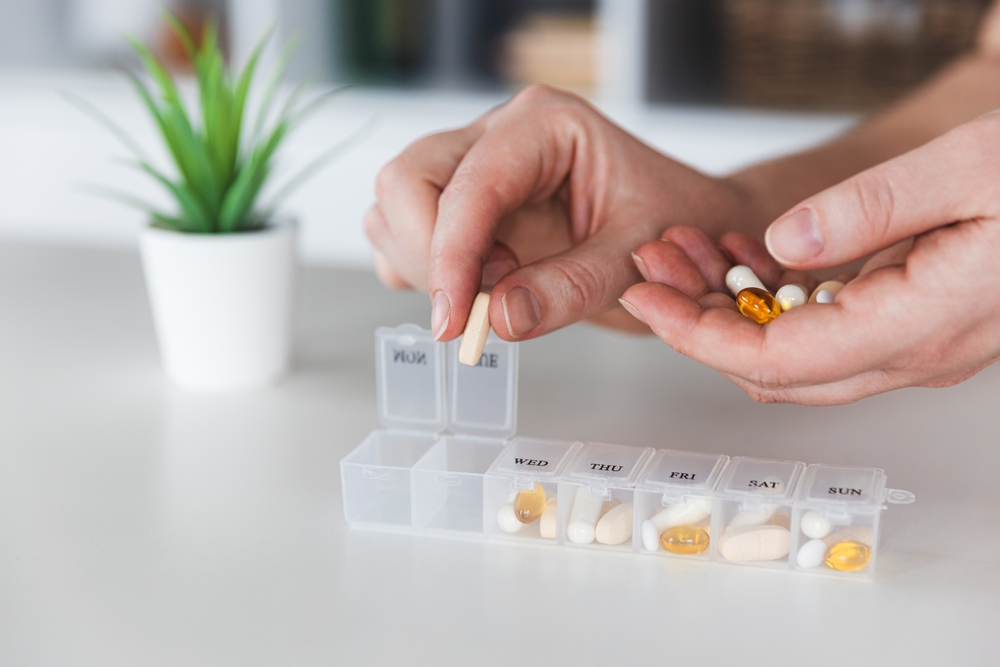
When opening your medicine cabinet to take cold medicine, pain medication, or sleep aid, you’re also opening a world of trouble for your pet. While medications can alleviate your symptoms, they can be harmful and potentially fatal to your furry friend. Read our Urgent Pet Care Omaha team’s list of 10 human medications that are toxic to pets, and learn how to protect your four-legged friend from harm.
Pet-toxic medication #1: Nonsteroidal anti-inflammatory drugs
Nonsteroidal anti-inflammatory drugs (NSAIDs), such as ibuprofen (Advil and Motrin), naproxen (Aleve), and aspirin, are commonly used to alleviate people’s pain and reduce inflammation. However, if your pet ingests any of these—even a small quantity—they can develop severe gastrointestinal (GI) ulcers and kidney failure. Never administer NSAIDs to your pet without explicit instructions from your veterinarian.
Pet-toxic medication #2: Acetaminophen
Acetaminophen (Tylenol) is toxic to cats and dogs, although cats are more sensitive and can develop toxicity from a tiny amount. Pets’ acetaminophen toxicity can cause liver failure, red blood cell damage, and difficulty breathing. Keep all medications containing acetaminophen safely stored away from pets, and never give them this drug without veterinary guidance.
Pet-toxic medication #3: Antidepressant medications
Antidepressant medications, such as fluoxetine (Prozac), sertraline (Zoloft), paroxetine (Paxil), amitriptyline (Elavil), and clomipramine (Anafranil), manage people’s depression, anxiety, and various mental health disorders. If your pet, ingests these drugs, they can develop serotonin syndrome, which manifests as agitation, tremors, hyperthermia, heart arrhythmias, seizures, and death.
Pet-toxic medication #4: Benzodiazepines
Drugs, such as alprazolam (Xanax), diazepam (Valium), and lorazepam (Ativan), treat people’s anxiety, insomnia, and seizures. However, if your pet ingests one of these drugs, they can experience sedation, lethargy, and coma, so keep all benzodiazepines stored securely out of your furry pal’s reach.
Pet-toxic medication #5: Attention deficit hyperactivity disorder medications
Medications, such as methylphenidate (Ritalin) and amphetamine/dextroamphetamine (Adderall), treat attention deficit hyperactivity disorder (ADHD) and narcolepsy in people. If your pet ingests any of these stimulants, they can develop an elevated heart rate and body temperature, tremors, and seizures.
Pet-toxic medication #6: Opioids
Opioid medications, such as oxycodone, hydrocodone, and morphine, are potent pain relievers for people. However, when not administered under veterinary guidance, these drugs can cause respiratory depression and central nervous system depression in pets, leading to difficulty breathing, sedation, and coma.
Pet-toxic medication #7: Cold and flu medicines
Decongestants, cough suppressants, and expectorants are common cold, cough, and flu medicine ingredients, and while they can make you feel better when you’re under the weather, they can seriously compromise your pet’s health. If your pet ingests the decongestants pseudoephedrine and phenylephrine, they can develop an elevated heart rate and blood pressure, tremors, seizures, and potentially fatal complications. Ingestion of dextromethorphan, a common cough suppressant, can lead to agitation, vomiting, irregular heart rhythms, and coma in pets.
Pet-toxic medication #8: Sleep aids
Sleep aids, including prescription medications, such as Ambien and over-the-counter (OTC) supplements, such as melatonin, contain ingredients that are harmful to pets if ingested. Pets’ sleep aid toxicity signs may include GI upset, disorientation, heart rate changes, severe sedation, respiratory depression, coma, or death.
Pet-toxic medication #9: Birth control pills
Birth control pills often contain estrogen and progestin, which can cause bone marrow suppression, leading to anemia and other serious complications in pets. If your pet ingests a birth control medication, their signs may include GI upset, weakness, pale gums, lethargy, and an increased heart rate.
Pet-toxic medication #10: Antihistamines
While antihistamines, such as diphenhydramine (Benadryl), are generally safe for pets when administered in appropriate doses under veterinary guidance, certain formulations and higher doses can be toxic. Toxicity signs include lethargy, vomiting, diarrhea, and seizures.

Protect your pet from medication toxicity
While this list does not include all the human medications that are dangerous for pets, the most common categories are highlighted. Always remember that a drug safe for people’s use can be dangerous—and potentially deadly—for pets. If you suspect your pet has ingested any medication meant for humans, contact your primary care veterinarian, an animal poison control center, or our Urgent Pet Care Omaha team immediately. Prompt action can make all the difference in ensuring your furry friend’s health and well-being.
Always store medications securely out of your furry pal’s reach, and never administer any medication to your pet without explicit instructions from your veterinarian. In addition, keep your pet out of the room while you take your medication to ensure you can find dropped pills before they do. Your vigilant care can help keep your pet safe from the dangers of people’s medications.
If you suspect your pet has ingested medication intended for people, contact our Urgent Pet Care Omaha team immediately, as urgent care can very well save your furry friend’s life if they have ingested a toxin.

